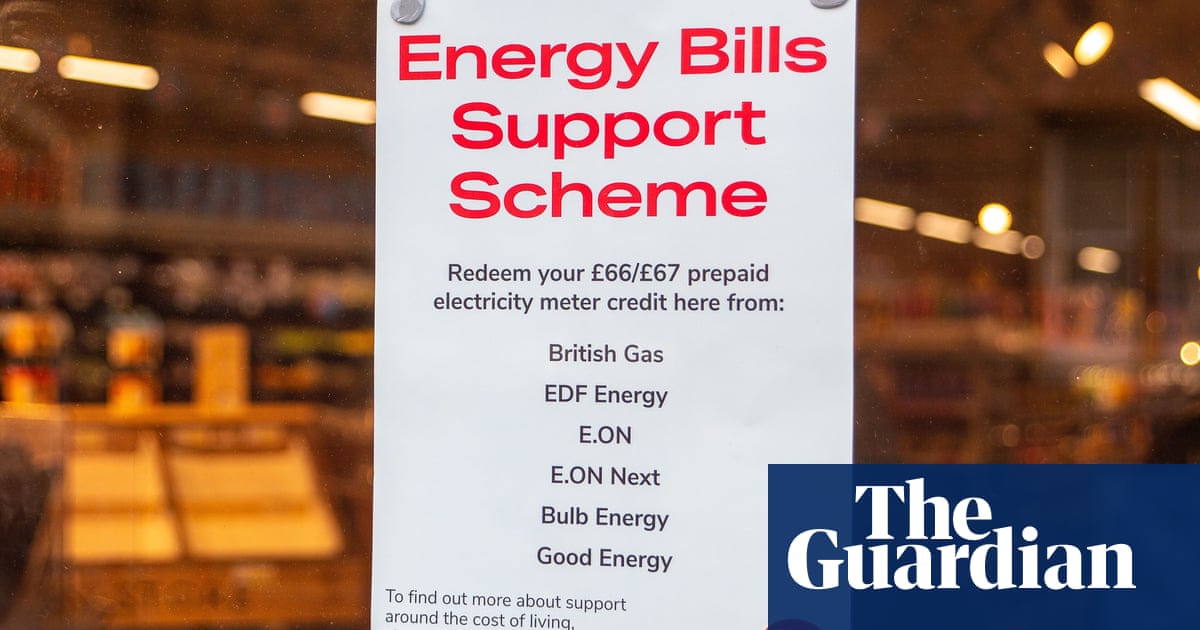
A price cap on the amount suppliers can charge for energy will fall by £999 to £3,280 from April but bills will still rise due to a planned cut in government support.
The energy regulator for Great Britain, Ofgem, said on Monday that its quarterly cap on household bills for average dual fuel, direct debit customers would fall by 23% for the three months from 1 April, from £4,279 for the January to March quarter.
Consumers will not actually pay this figure as the government’s energy price guarantee and its £400 discount scheme subsidise household bills, keeping the price for a typical household at £2,100 a year. However, from April the price guarantee will become less generous and the discount will be withdrawn, meaning the typical annual bill will rise to £3,000.
The chancellor, Jeremy Hunt, who plans to announce the budget on 15 March, faces calls to postpone the cut in support, which will lead to some bills rising by as much as 40% on last year.
Ofgem’s chief executive, Jonathan Brearley, said: “Although wholesale prices have fallen, the price cap has not yet fallen below the planned level of the energy price guarantee. This means that on current policy, bills will rise again in April. I know that for many households this news will be deeply concerning.”
Brearley said the regulator was studying the feasibility of a social tariff for vulnerable customers with “urgency”.
The significance of Monday’s announcement is that the Ofgem cap, which limits what suppliers can charge per unit of energy, is used to calculate how much the government will pay energy suppliers to limit typical bills to £3,000.
As long as the level of the price guarantee is lower than the Ofgem price cap, the government will pay suppliers the difference to cover the cost of buying wholesale energy at prices that have been inflated by the war in Ukraine.
Wholesale gas prices have fallen sharply in recent months but the drop is yet to feed through into household bills because suppliers buy their energy months in advance. As a result, the price cap is expected to fall to about £2,100 from July for the remainder of the year, meaning the government would not have to subsidise bills.
The consumer campaigner Martin Lewis has urged the chancellor to keep support in place until July, so people do not face three months of hardship.
The Liberal Democrat leader, Ed Davey, said: “The Conservatives’ plan to hike energy bills in April will come as a hammer blow to families already struggling with soaring mortgages and rents, shopping bills and tax rises.”
James Taylor, the director of strategy at the disability equality charity Scope, said: “We know budgets are stretched beyond breaking point. In April, disabled households having to find on average another £500 a month is going to be an impossible challenge.”
Holly Holder of the Centre for Ageing Better said keeping the guarantee at £2,500 would be a “vital short-term intervention” and called for a social tariff to be implemented before next winter.
Suppliers are obliged to write to customers a month before a price rise, meaning letters are expected to go out this week.
after newsletter promotion
The consultancy Cornwall Insight has said that if the guarantee were to increase to £3,000 as planned, the cost to the government would be £26.8bn, while if it were to remain at £2,500, the cost would be £29.4bn.
The Resolution Foundation thinktank said the guarantee was set to cost £1.4bn for the next financial year, 90% more than the £12.8bn forecast in November’s autumn statement.
Ofgem said that from 1 April, the electricity price cap per unit would fall from 67p a kilowatt hour to 51p, and a 53p-a-day standing charge. For gas, the unit cost will fall from 17p to 13p per kWh, with the standing charge up 1p to 29p a day.
About 4 million prepayment meter customers will pay an additional £45 a year, as energy companies say they cost more to serve. The disparity in the cost between prepay and direct debit customers has been questioned amid the scandal over forced installation of prepayment meters.
For customers who pay via cheque or cash, the cap has fallen by £1,051 from £4,533 to £3,482, meaning they pay about £200 more than direct debit customers.
The cost to bill payers of transferring customers over from 28 suppliers that went bust during the energy crisis, excluding Bulb, fell from £61 to £19 under the new cap calculation.
Ofgem said consumers did not need to take “immediate action” on Monday’s announcement and should contact their supplier if they were struggling to pay bills.
The cap is calculated on a typical household’s energy use and consumers may still pay more than that if they use more energy.
https://news.google.com/rss/articles/CBMiTWh0dHBzOi8vd3d3LnRoZWd1YXJkaWFuLmNvbS9tb25leS8yMDIzL2ZlYi8yNy9lbmVyZ3ktcHJpY2UtY2FwLXVrLW9mZ2VtLWFwcmls0gFNaHR0cHM6Ly9hbXAudGhlZ3VhcmRpYW4uY29tL21vbmV5LzIwMjMvZmViLzI3L2VuZXJneS1wcmljZS1jYXAtdWstb2ZnZW0tYXByaWw?oc=5
2023-02-27 09:06:00Z
1774893294
Tidak ada komentar:
Posting Komentar